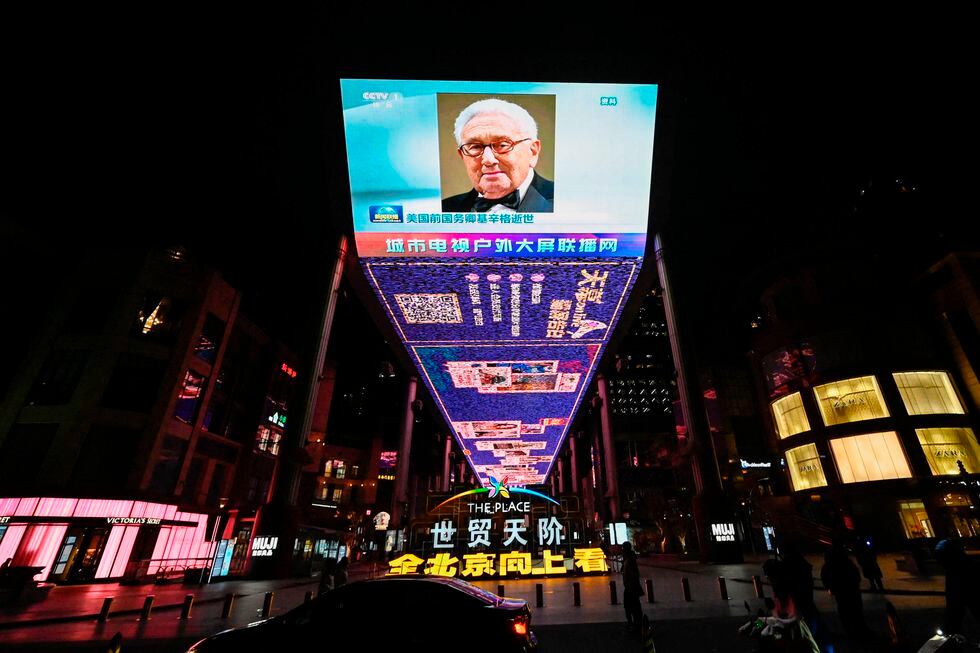A Nobel Prize a Year, 100 Years of Kissinger
(Taiwan) on 1 December 2023
by Editorial (link to original)
In the film “The Sum of All Fears,” adapted from the Tom Clancy novel of the same name, there is a behind-the-scenes storyline that most people overlook, that deftly illustrates the achievements, faults and thinking of the controversial, centenarian mediator Kissinger.
Although the film is fiction, it is set against a backdrop of real-world events. It portrays the outbreak of the fourth Arab-Israeli War or Yom Kippur War in 1973, and an Israeli warplane carrying a nuclear bomb being shot down. In the film, the nuclear bomb falls into the hands of neo-Nazi terrorists 30 years later who intend to trigger a third world war between the U.S. and Russia.
In the movie, while the U.S. and Russia are secretly investigating, Jack Ryan, the CIA agent in charge of the American investigation, concludes there is a conspiracy to provoke a world war — but he has no way to verify this with high-level Russian officials. Finally, through CIA Director Cabot, Ryan makes contact with a Russian informant, and although he is unable to prevent the terrorists from detonating the nuclear bomb, he successfully averts a U.S.-Russian nuclear war. The two countries eventually sign a peace agreement and dispatch their agents to assassinate all the masterminds behind the events. Later, Ryan learns that Cabot’s informant was the head of the Russian intelligence unit, and that the two had secretly been in contact to prevent the outbreak of World War III.
With the power Kissinger wielded while in office and the public-private relationships he established with heads of state and even with informants around the world for decades, the real extent of his influence is bound to have been far greater than that of the intelligence chiefs in the film. It is interesting to note that in November 2002, President George W. Bush appointed Kissinger chairman of the National Commission on Terrorist Attacks Upon the United States to investigate the 9/11 attacks. However, when asked to disclose any potential conflicts of interest, Kissinger said he would not release any details about his business clients and subsequently tendered his resignation.
Equally noteworthy were the consummate skills at great power games and tightrope-walking that Kissinger displayed throughout his life, as well as his hesitation in thought and in action that often led him to treat small countries and foreign nationals like disposable pawns in order to avoid stepping on world war red lines.
In his later years, Kissinger emphasized that the rise of China was a political and historical necessity, and preventing a confrontation between the great powers should be the bottom line of how the world works rather than considering the benefit to mankind; that the only outcome for a world in which the two major powers confronted each other would be global losses. On the eve of the Russia-Ukraine conflict, he pointed out that failing to reopen talks with Russia would have dire long-term consequences for the stability of Europe.
Such unconventional perspectives may seem at odds with Kissinger in his prime when he devoted himself to fighting the expansion of communism. But if you look at his subsequent efforts to extricate the U.S. from its Vietnam War predicament, and even his feigning a stomachache to travel from Pakistan to Beijing and lay the groundwork for establishing diplomatic relations between the Chinese Communist Party and the U.S., it is clear that there was always a consistent guiding principle to Kissinger’s political thought.
The Nobel Peace Prize is awarded almost every year, and it has been awarded to 111 individuals. But among those laureates, Kissinger was one of very few also to have been tainted with the blood of war, and the extent of his influence was head and shoulders above the rest. How many inside sources did he have around the world? And did he work with these informants to prevent a world war? With his passing, we fear that the answer to those questions will be an enigma for the ages.

